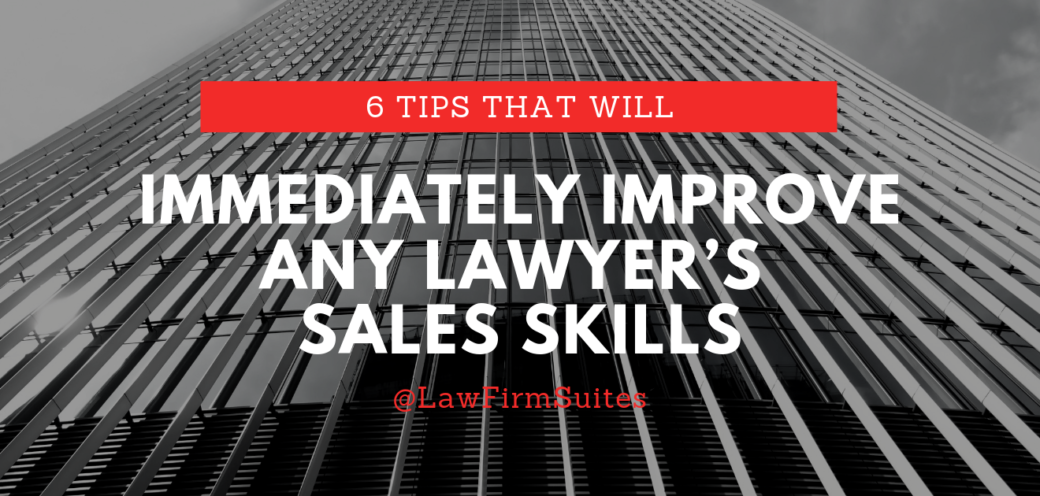You didn’t go to law school to learn sales, but if you’re going to be a successful lawyer then you’ll need sales skills. These tips will help!
Almost no one pursues a professional degree to become a salesman.
But every professional — doctors, bankers, CPAs, massage therapists, and chefs — has to learn how to sell their services.
For many lawyers, there’s something about selling that even feels unethical about selling. Like it’s beneath the profession. And like most others, lawyers also are not breaking down the door with excitement to learn sales techniques.
But if you hope to build and sustain a successful law practice then you’re going to have to learn how to sell your services. But how do you learn these skills, even without having a ton of practice or leads to gain experience with?
In our profession, selling sometimes gets a bad rap. But that doesn’t have to be the case. Follow this article to get 6 tips on how to improve your sales skills right away, then you can close more deals and grow your firm into what you had always imagined it would be.
1. Redefine What Selling Really Means
Retool your thinking so that you understand selling the same way you understand your chosen practice area. Strictly speaking, a practice is a habit, a process, a custom, or a system. Sales is a practice. Once we perceive sales as a skill that can be learned rather than a dark art form, we begin to realize that there is nothing demeaning or insurmountable about it. Lawyers are trained to learn how to do new things, including sales.
2. Think About the Client’s Mindset
The key to improving your sales ratios and converting leads into clients is to understand the customer’s mindset, and adjust your conversations to best resolve their problems. Today’s legal consumers are more educated than ever before, so they most likely will have a better understanding of what they need and who they are looking for before you ever even speak with them. Use this to your advantage, see what they know and lean on your experiences in your specific field to ultimately close more deals.
3. Be Real and Have a Real Conversation
While it is not a bad idea to have a pitch or script on hand, you shouldn’t read from a script when talking to potential clients about their legal matter and why they should be hiring you. People want to work with other people, not emotionless robots.
Instead, you need to have a conversation with your potential clients where you hit all the points on your “pitch” but where you also ask questions, listen to them, and offer them a solution to a problem. All while trying to connect to them on a human level and have a real conversation!
4. Don’t Focus on the Sale, Think About Being Helpful
Selling legal services is not about convincing anyone to purchase something they do not need. Chances are if you are engaging in a sales activity with a prospective client, they already need to purchase legal services. Your job is to merely convince the prospective client why they should hire you and not a competitor.
If you shift your focus away from the sale, and more on how much additional value that a client will get by working with you, the process becomes more about being helpful than transactional. And plus, being helpful feels good.
5. Talk Less and Listen More
It should come as no surprise to learn that people like to talk about themselves. This principle especially comes into play when talking about sales. People want to talk about themselves and like those who take the time to listen. On top of that, people like to buy things from people they like.
Therefore people are more likely to become your client if they like you, and one super-easy way to do that is to sit back and listen. Statistically, you should only be talking 20% of the time, while the other 80% should be devoted to the customer asking questions, answering your inquiries and most importantly, telling you about themselves.
6. Build Buyer Personas
Before meeting with a potential client you need to know their buyer persona. This will make a massive difference in the likelihood of them becoming a paying client. A buyer persona is like a sales cheat sheet that can help walk you through the preferences and styles of different buyers. It’s essential to understand what’s important to each individual buyer and their decision-making process.
You will, of course, have to do your homework and determine the different paths of your various buyer personas, but you will be thanking yourself for taking the time to research and develop the different personas. When you know the persona of the lead your selling to, you can more easily match your selling process to their buying process and ultimately win more deals.


